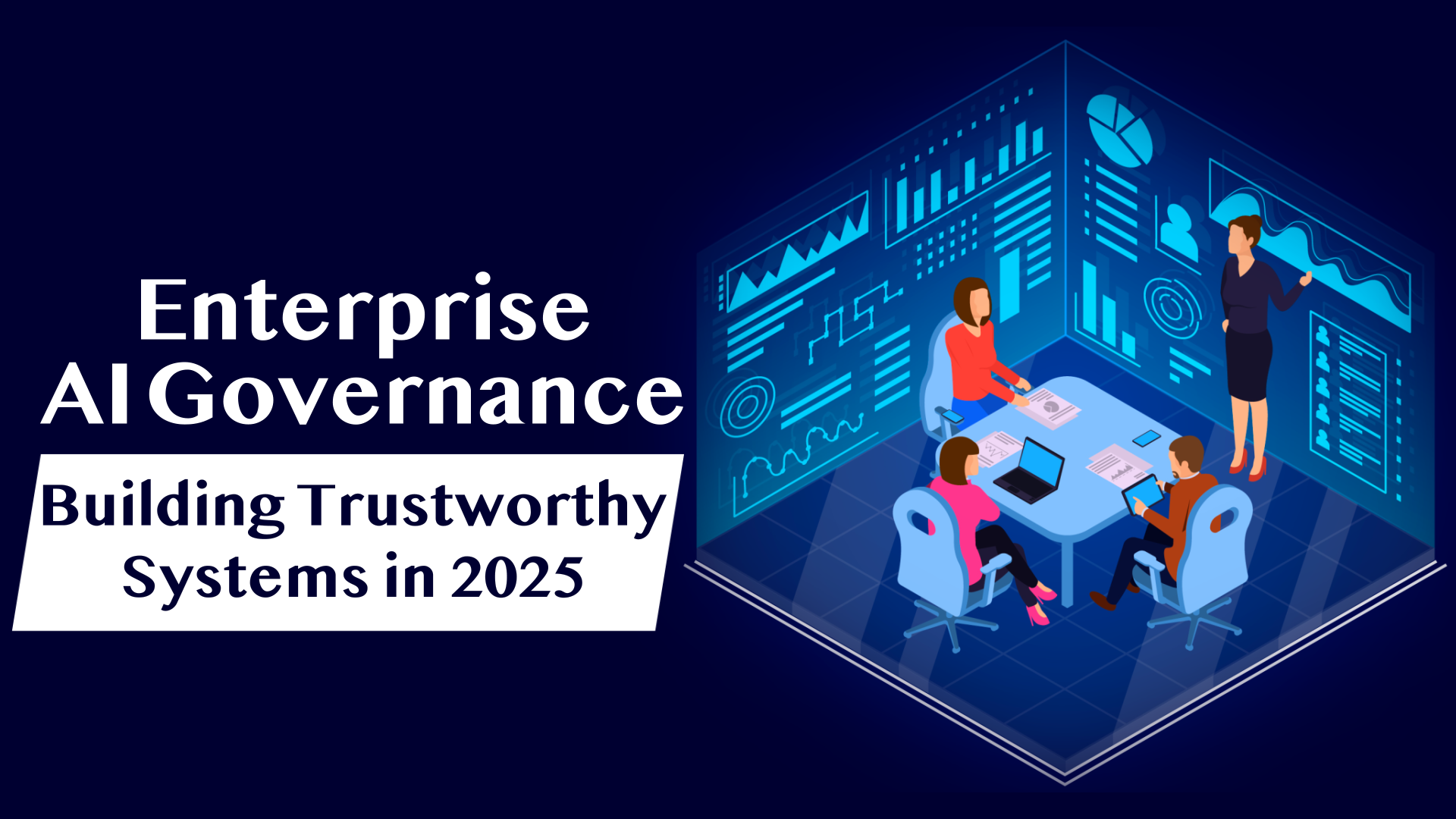
AI Governance in Business 2025: Building Trust in the Age of Intelligent Enterprises
- by Indu Sharma
In 2025, Artificial Intelligence (AI) continues to redefine business operations—from decision-making to customer interaction and supply chain optimization. But as enterprises rapidly scale their AI use, the need for AI governance in business becomes more urgent than ever.
Ensuring transparency, accountability, and fairness in automated systems is no longer optional—it’s a strategic necessity.
In this article, we’ll explore the framework for responsible AI practices, the business case for robust governance, and how enterprises can implement governance systems that build trust, reduce risk, and drive long-term value.
What Is AI Governance in Business?
AI governance refers to the frameworks, policies, and practices that guide how AI systems are developed, deployed, and monitored. It ensures AI behaves ethically, complies with laws, and aligns with organizational values.
This involves:
-
Transparency in data usage and decision-making
-
Bias mitigation in algorithms
-
Explainability of AI outputs
-
Regular monitoring and auditing
-
Human oversight and accountability mechanisms
In essence, AI governance acts as the ethical backbone for enterprise AI systems—ensuring technology works for people, not against them.
Why AI Governance Matters in 2025
AI is now embedded in critical enterprise functions: automated lending, healthcare diagnostics, recruitment algorithms, predictive maintenance, and even legal risk assessments. As AI grows, so do the risks.
Key drivers:
-
Regulatory Pressure – Global laws like the EU AI Act and India’s Digital India Act demand compliance.
-
Reputational Risk – Biased hiring or opaque credit scoring can destroy trust.
-
Stakeholder Trust – Customers and investors want ethical AI practices.
-
Operational Reliability – Governance prevents black-box failures and ensures security.
The Pillars of Responsible AI Practices
-
Fairness and Bias Mitigation
-
Conduct audits on data and algorithms
-
Use diverse datasets
-
Apply fairness-aware machine learning
-
-
Transparency and Explainability
-
Provide clear, non-technical explanations
-
Maintain audit trails
-
Use interpretable models for high-stakes use cases
-
-
Privacy and Data Security
-
Anonymize or tokenize sensitive data
-
Apply federated learning techniques
-
Comply with data residency laws
-
-
Accountability and Human Oversight
-
Define escalation paths for AI decisions
-
Establish ethics review boards
-
Use human-in-the-loop systems
-
-
Continuous Monitoring and Auditing
-
Track model drift and anomalies
-
Conduct periodic audits
-
Document retraining logs
-
Implementing AI Governance in the Enterprise
Step 1: Establish a Framework
-
Ethical AI charter
-
Risk classification system
-
Compliance SOPs
Step 2: Build Cross-Functional Teams
-
Chief AI Ethics Officer
-
Governance Committee
-
AI Champions in each department
Step 3: Classify AI Use Cases by Risk
-
High-risk: credit scoring, healthcare, hiring
-
Medium-risk: pricing, segmentation
-
Low-risk: chatbots, forecasting
Step 4: Embed Governance in Development Lifecycle
-
Ethical impact assessments
-
Model cards & datasheets
-
Edge-case testing
Step 5: Invest in AI Governance Tools
-
IBM Watson OpenScale
-
Microsoft Responsible AI Dashboard
-
Fiddler AI
-
Truera
Step 6: Train Employees
-
Ethics and compliance
-
Bias awareness
-
Crisis management in AI failures
Step 7: Communicate AI Ethics
-
ESG reports
-
CSR communications
-
Product onboarding
Case Studies: AI Governance in Action
-
TCS – Built an AI ethics charter and bias detection tools.
-
HDFC Bank – Uses explainable AI in credit scoring with human underwriter reviews.
-
Microsoft – Enforces its Responsible AI Standard globally with developer dashboards.
Challenges in AI Governance
-
Lack of uniform regulations
-
Skill gaps in compliance and ethics
-
Legacy data systems
-
Cost of implementation
Future Trends (2025–2030)
-
AI compliance audits will become mandatory
-
Synthetic data governance will rise
-
Real-time automated policy enforcement
-
Sector-specific AI governance templates
-
AI Governance-as-a-Service (AIGaaS) will emerge
Conclusion
In 2025, AI governance is not just about compliance—it’s about trust. Enterprises that invest in responsible AI practices today will lead tomorrow, not only in innovation but also in credibility.
At Value Innovation Labs, we help businesses integrate responsible AI governance frameworks into their enterprise strategy. By embracing ethical AI, organizations can scale smarter while building trust with customers and regulators.
Learn more about how we enable enterprises to move toward sustainable and ethical AI adoption at Value Innovation Labs.
FAQs
Q1. What is AI governance in business and why is it important?
AI governance ensures AI systems are ethical, legal, and aligned with company values. In 2025, it is critical to mitigate risks like bias, privacy breaches, and reputational damage.
Q2. How can businesses implement responsible AI practices?
By creating governance frameworks, setting up cross-functional teams, using bias detection tools, and embedding ethics into AI development lifecycles.
Q3. Are there tools to support enterprise AI governance?
Yes—IBM Watson OpenScale, Truera, Microsoft Responsible AI Dashboard, and Fiddler AI are among the top platforms.
In 2025, Artificial Intelligence (AI) continues to redefine business operations—from decision-making to customer interaction and supply chain optimization. But as…
